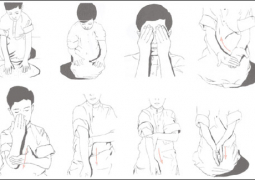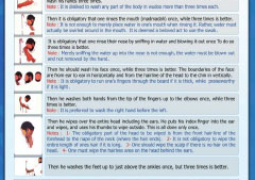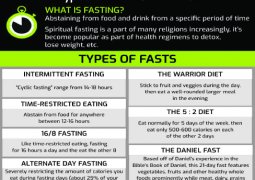
Najasah refers to impure substances that the Muslim must avoid and wash off if they should happen to contaminate his clothes, body and so on. Says Allah in the Qur’an, “Purify your raiment” (al-Mudathar 4); and, “Allah loves those who repent and who purify themselves” (al-Baqarah 222). The Messenger of Allah also said, “Purity is half of the faith.”
Dead Animals
This refers to animals which die from “natural causes,” that is, without the proper Islamic way of slaughtering. It also includes anything that is cut off of a live animal. Abu Waqid al-Laithy reported that the Prophet, upon whom be peace, said, “What is cut off of a live animal is considered dead,” i.e., it is considered like an animal that has not been properly slaughtered. This is related by Abu Dawud and by at-Tirmizhi, who classifies it as Hassan and says that the scholars act according to this hadith.
Dead animals of the sea and dead locusts
Ibn ‘Umar reported that the Messenger of Allah said, “Two types of dead animals and two types of blood have been made lawful for us. The types of dead animals are seafood and locusts. The two types of blood are the (blood of the) liver and the spleen.”
This is related by Ahmad, ash-Shaf’i, al-Baihaqi and ad-Daraqutni. The hadith is weak, but Imam Ahmad says that it is authentic in mauqoof form. Abu Zar’ah and Abu Hatim have said the same. Such a report has the implication of a marfu’ hadith because a companion saying, “This was allowed for us” or “This was forbidden for us” is like one of them saying, “We were ordered to do this,” or “We were forbidden to do this,” and so on. (Such statements are considered marfu’ with respect to their regulations). And we have already mentioned the Prophet’s statement concerning the ocean, “Its water is pure and its ‘dead animals’ are allowable (to eat.).”
Dead animals that have no running blood
(That is) bees, ants, and so on. They are considered pure. If they fall into some substance and die, the substance will not become impure. Ibn al-Munzhir said, “I do not know of any disagreement concerning the purity of such water save what has been related from ash-Shaf’i. It is well-known that he views them as being impure. Nevertheless, it does not bother him if the object falling into a substance does not alter it (in any way).”
Bones, horns, claws, fur, feathers, and skin and so on of dead animals
All of these are considered pure. Concerning the bones of dead animals, az-Zuhri said, “I have met some scholars of the preceeding generations who used such objects for combs and pots for oil, and they did not see anything wrong in that.” This is related by al-Bukhari. Said Ibn ‘Abbas, “The client of Maimunah was given a sheep as charity, and it died. The Messenger of Allah, upon whom be peace, passed by it and said, ‘Why do you not remove its skin, treat it and put it to use?’ She said, ‘It is dead’ (i.e., it has not been slaughtered properly). He said to her, ‘Only eating it is forbidden.”’ This is related by the group. Ibn Majah attributes the incident to Maimunah and her client. Al-Bukhari and anNasa’i do not mention treating the skin. It is reported from Ibn ‘Abbas that he recited: “Say (O Muhammad): “In all that has been revealed to me, I do not find anything forbidden to eat; if one wants to eat thereof, unless it be carrion, or blood poured forth, or swine flesh...” (al-An’am 145). Then he said, “What is forbidden is its meat. As for its skin, skin used for waterskins, teeth, bones, fur and wool, they are permissible.” This is narrated by Ibn Munzhir and Ibn Hatim. Similarly, its rennet and milk are considered pure. This is supported by the fact that when the companions conquered Iraq, they ate the cheese of the Magians which was made from rennet, although their slaughtered animals were considered the same as ‘dead animals.’ It is confirmed from Salman al-Farsi that when he was asked about cheese, clarified butter and pelts, he said, “What is permissible is what Allah made permissible in His book. What is forbidden is what Allah made forbidden in His book. What he omits, He has pardoned for you.” It is well-known that he was being asked about the cheese of the Magians, as Salman was ‘Umar’s deputy in Mada’in, Iraq.
Blood
This includes blood that pours forth from an animal’s body, such as blood from a slaughtered animal, or from menstruation, except for what small amounts are overlooked. Ibn Juraij said about the Qur’anic verse “...or blood poured forth...” (al-An’am 145), that this is the blood that flows out. The blood that does not flow out, but remains in the veins, is permissible. This is related by Ibn al-Munzhir. And it is also related from Abu Majlizn in his discourse on blood that he was asked, “What about the blood that remains in the slaughtered sheep or at the top of the cooking pot?” He answered, “There is no problem with it. What is forbidden is the blood that flows out (of the animal at the time of slaughtering).” This was recorded by ‘Abd ibn Hameed and by Abu ash-Shaikh. It is also related from ‘Aishah that she said, “We used to eat the meat when the blood was streaking the pot.” Al-Hassan said, “The Muslims always prayed, even while they were bleeding.” This was mentioned by al-Bukhari. It is confirmed that ‘Umar prayed while his wound was bleeding. Elucidating the point, Ibn Hajr says in Fath al-Bari (a commentary on Sahih al-Bukhari): “Abu Hurairah did not see anything wrong in a drop or two of blood during the prayers. Based on this report from Abu Hurairah, the blood of a flee or the blood that comes from a pimple are to be overlooked. Abu Majlizn was asked about pus that gets on the body or the clothes. He said, ‘There is nothing wrong with them. Allah mentions only the blood, not the pus.
“’ Commenting on the subject, Ibn Taimiyyah says, “It is obligatory to clean the clothes from pus, purulent matter or similar fluids.” He also says, “There is no proof concerning its impurity.” It is preferred for the person to avoid contact as much as possible with these substances.
Pig’s meat
According to the verse (al-An’am 145) quoted earlier, items mentioned therein are impure. The pronoun ‘they’ refers to all three of the mentioned items. It is, however, allowed to knit with the hair of a pig according to most of the scholars.
Vomiting of a person, urine, and excrement
There is agreement among the scholars that these objects are impure. But, a slight amount of vomit (commonly understood as a small amount of liquid) and the urine of an unwearied male baby are overlooked and pardoned. It is sufficient just to sprinkle water over the urine of an unweaned male baby. This is based on the hadith of Umm Qais. She came to the Messenger of Allah with her unwearied son. After a while, the baby urinated in the Prophet’s lap. The Prophet, upon whom be peace, called for some water, which he sprinkled over his clothes, and did not give them a complete washing. This is related by al-Bukhari and Muslim.
‘Ali narrated that the Messenger of Allah said, “The urine of a baby boy should have water sprinkled upon it. The urine of a baby girl is to be washed off.” Says Qatadah, “This refers to a male baby that has not yet begun to eat. If he already eats, then the garment is to be washed.”
This hadith is related by Ahmad, Abu Dawud, at-Tirmizhi and Ibn Majah. In al-Fath, Ibn Hajr says its chain is sahih.
Sprinkling is sufficient as long as the boy is still nursing. If he eats solid food, his urine must be washed from the clothes and body. There is no disagreement on this latter point. Perhaps the reason for this exemption to the male baby’s urine is that people have a tendency to carry their male babies around, and it would have been difficult to clean the clothes after their frequent urinations.
To be continued





